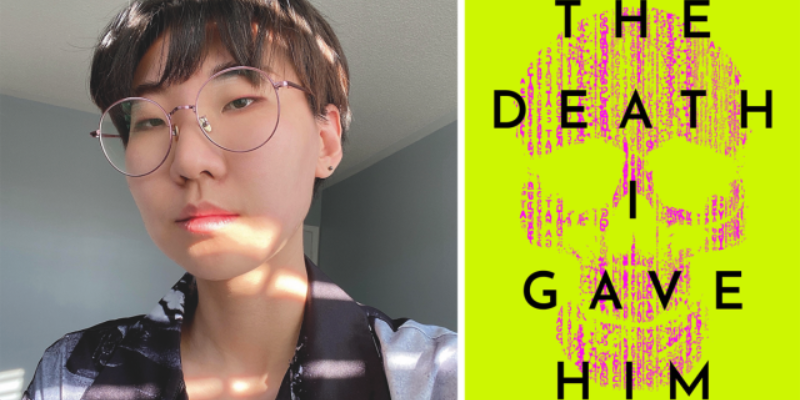
Em X. Liu on Putting Hamlet in a Sci-Fi Lab
In Conversation with Brenda Noiseux on the New Books Network
Em X. Liu’s The Death I Gave Him is a queer, locked-room science fiction mystery inspired by Shakespeare’s Hamlet.
Working at Elsinore Labs, Hayden Lichfield and his father are in relentless pursuit of the cure for mortality. The night of Hayden’s breakthrough should be cause for celebration until he finds his father murdered. As he flees with the research, his uncle puts Elsinore Labs on lockdown. Trapped inside with only 4 other people, old secrets, alliances, and lies are revealed. When the murderer starts to look like Hayden, he leans on his only ally, the laboratory’s AI, Horatio.
“Hamlet is one of those stories that we keep telling ourselves,” says Liu. “ Certainly I was aware of the idea that people would be coming into this with some preconceptions; I think that’s inevitable. I tried to make certain choices that did kind of in an attempt to destabilize your relationship to the original text.”
From the episode:
Brenda Noiseux: How would you describe an overview of The Death I Gave Him?
Em X. Liu: I would describe it as like a near-future science fiction retelling or reimagining of Hamlet. I describe it that way because the inception of the novel really came from retelling or receiving Hamlet in this specific way. The sort of fun parts of it is that it’s set in a lab, in a locked lab over 24 hours. It’s kind of a murder mystery, kind of an emotional thriller. And, ultimately, I would really describe it as a character study.
BN: Oftentimes we think of Hamlet as just a tragedy, so that’s an interesting take. Why did you decide to do a locked room thriller, murder mystery?
EXL: If you approach the story of Hamlet and you go in blind, so to speak, you essentially are approaching it as a murder mystery. Part of the central tension of the play is whether or not Hamlet is mad, whether or not he’s telling the truth, and whether or not he can trust what he has seen. Approaching as an audience where you don’t have any previous expectations of the story, you have to approach it from the way where we don’t know how much of what we’re seeing is true. And that really puts you in that same mindset as Hamlet in the play.
BN: We normally see in sci fi is a lot of this all knowing or all powerful AI that’s controlling ships or controlling worlds. You actually see something a little more fragile and a little more human.
EXL: A big preoccupation of the novel is that idea of what does it mean to be human? What does it mean to be a person? Is that the same thing? What does it mean to be like a person with consciousness but without a body? And then, conversely, what does it mean to be trapped inside a body? I really wanted Hayden and Horatio, respectively, to act as mirrors to each other, influence each other, and change and grow alongside each other along those themes
BN: One of the things I really enjoyed about your book is how that inexplicable draw of Elsinore Labs, almost as a character, this kind of gravitas, in the background. Everyone has this inexplicable draw to it. And can you escape it and is it something you escape?
EXL: I love setting as character. I think creating a vivid setting is so important in immersing yourself in the atmosphere of a story. I wanted Elsinore to have that slightly clinical and yet, something irresistible, is a good word for it, about it. The image that I had in mind is this image of Elsinore on the water and it’s dark out. The water is so dark, it looks almost black. Elsinore is just there in the distance and it’s lit up, because it’s always lit up, because there’s always something going on inside it. And you see that across the pier and it calls to you. It draws you across the water.
BN: Let’s talk a little bit about Felicia and how much agency you’ve given her in this book.
EXL: I think there is a tendency to cast that character as someone who is slightly historical or a bit too emotional or acting on impulse and madness in a way that some of the male characters who have similar archetype, similar experiences, wouldn’t necessarily be described that way. What I wanted to do with Felicia is create a character who was emotionally volatile because she is in some very stressful situations. And is actively drawing together some parallels between her and Hayden because they go through pretty similar things on a narrative stance. They both again are “big emotions” people and they both process in their own way.
__________________________________
Em X. Liu is a writer and recent biochemistry graduate, which means they love stories about artificial intelligence and Shakespeare in equal measure. Since immigrating to Canada, they never go long without hopping on a plane to wander new places. But out of all the cities they’ve been to, they still love their home in Toronto the most.
Brenda Noiseux hosts New Books in Science Fiction.
New Books Network
The New Books Network is a consortium of author-interview podcast channels dedicated to raising the level of public discourse by introducing serious authors to a wide public via new media. We publish 100 new interviews every month and serve a large, worldwide audience. The NBN is staffed by Founder & Editor-in-Chief, Marshall Poe, and Co-Editor, Leann Wilson. Feel free to contact either one of us for more information.



















